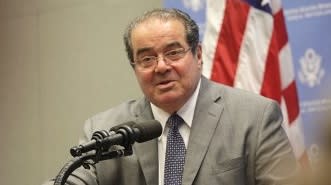Scalia comments as Supreme Court refuses big religion case
The U.S. Supreme Court said on Monday that it won’t accept a big test case about the role of religion in public facilities and the separation of church and state.
The case of Elmbrook School District v. Doe, which the Justices voted on in private conference recently, was denied on Monday morning.
Justice Antonin Scalia attached a seven-page dissent to the announcement, saying he believed the Court should have accepted the case and the denial was inconsistent with the Court’s reasoning in another recent religion case, Town of Greece v. Galloway. (Justice Clarence Thomas also joined in the dissent.)
“Because [Town Of Greece] made clear a number of points with which the Seventh Circuit’s decision is fundamentally inconsistent, the Court ought, at a minimum, to grant certiorari, vacate the judgment, and remand for reconsideration,” Scalia said.
Link: Read Scalia’s dissent
If the Court had accepted Elmbrook, it would have been added to its list of merit cases for the Court’s next term, which starts in October 2014.
The Elmbrook case had spent 14 years in the legal system before the Court’s decision was announced today.
In early May, a divided Court ruled in a case called Town of Greece v. Galloway, that prayers can be given at public government meetings, in what could be a historically significant moment for the religious Establishment clause in the First Amendment.
The Court had put Elmbrook on hold for the past year until it reached a decision in the Town of Greece case.
The Elmbrook School District v. Doe case involves the rental and use of a church sanctuary to host graduation ceremonies for two public schools.
A petition to hear the case in the Supreme Court was first submitted in December 2012, and it has been listed on the Justice’s private conference list eight times.
The case dates back 14 years, when in Brookfield, Wisconsin, a western suburb of Milwaukee, two local high schools started to host its graduation exercises in the sanctuary of Elmbrook Church, an evangelical congregation not affiliated with any denomination.
The practice began in 2000 with a choice by one of the high schools, at the request of its graduating class, to move the ceremony out of the school’s gym, because of limited conditions there. The church’s leaders and its congregation had no role in the graduation celebration, and there was no one on hand to offer any kind of religious counseling.
But for some current and former students and their parents, the site itself was the problem, with its religious symbolism and significance. They said the exposure to artifacts of faith offended them and compromised the experience of graduating.
The lawsuit continued, even though the district stopped using the sanctuary, as the challengers took the case on to the 7th U.S. Circuit Court of Appeals.
A three-judge panel there agreed with a trial judge, finding no First Amendment religion problem. But the full circuit court reconsidered. Splitting 7-3, that court found that the Elmbrook Church site could not avoid being coercive for the students and their younger brothers and sisters attending the ceremony.
Recent Stories On Constitution Daily
Supreme Court rules in “Politics and Lies” case
Podcast: P.J. O’Rourke on the Politics and Lies case
Supreme Court tracker: Two decision days this week
Podcast: Did President Obama violate the Constitution in the Bergdahl case?


